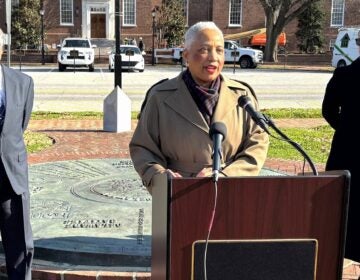Q&A: Dennis Davin, Tom Wolf’s pick for DCED, talks smart growth, transit-oriented development, and cities

Governor-elect Tom Wolf made his first two agency nominations this week, tapping Allegheny County’s economic development director Dennis Davin for the top job at the Department of Community and Economic Development (DCED), and picking former secretary of the Department of Revenue Eileen McNulty to serve as Revenue Secretary again.
We spoke with Dennis Davin about his experience in Allegheny County and Pittsburgh, and what it means for the Wolf administration’s approach to economic development.
PlanPhilly: We probably can’t get too deep in the weeds before you’ve actually spent some time at DCED, but I wanted to get a sense of what kind of values and experiences you’ll bring to the job.
Dennis Davin: From our experience in Allegheny County developing properties, we’ve really been doing it in a smart growth way we think. For example, we had some priorities for development, one of which was our brownfield sites. I don’t know how well you know Pittsburgh, but we had a number of steel mills and other facilities located right along the riverfront, and the collapse of the steel industry in the 70’s and early 80’s, these properties became vacant and a lot of them were dilapidated and had environmental issues with them. But more importantly, there were communities surrounding them that really saw a high level of disinvestment. A few years ago many of these places had 10% of the population they had previously, but they had the same housing stock, that could support 90% more population.
And there were some instances where we were successful in bringing growth back and life back to these communities – developing these brownfield sites, but while we were doing the environmental remediation, building infrastructure like roads and bridges for these brownfield sites, we were developing the communities around the sites, too. Our goal was really to do sustained development of these communities, continuing to develop housing, streetscape work, other municipal improvements, and continuing to do that on a year to year basis.
Another big priority was developing our airport. We had 9,000 acres of mine-scarred land around our airport, but our airport is arguably the biggest economic generator in southwest Pennsylvania, or maybe even the tri-state area. Developing those properties took a lot of thought and it couldn’t just be state resources or federal resources — we had to look at creative ways to raise money at the local level through tax increment financing (TIFs), Local Economic Revitalization Tax Assistance (LERTA). The local communities bought into it, and they did a tremendous job with these properties.
One project I’m particularly proud of is the Greater Allegheny Passage – it’s a trail system that goes from Point State Park in Pittsburgh all the way to Washington, D.C. in Georgetown. When we started, there were 9 miles of a gap in that trail, and unfortunately all 9 miles were in Allegheny County. We were able to do it through acquiring properties, acquiring easements, working with US Steel and other property owners to help get those properties in the hands of the Allegheny Trail Alliance, and getting rid of those gaps.
I’m director of economic development, so business development is a lot of what I do, but what we’ve seen is that there is crossover with the community development aspect, too. Lots of companies really want to locate on the river, they want to put their people in a place where they’re going to be comfortable and be productive. And we found that some of these brownfield sites were able to do that.
PP: Do you think that your focus on community development will be a departure from how some of your predecessors have approached this job?
DD: Well I’m not in the position just yet, and I haven’t had an opportunity to talk to many of the folks at DCED yet — my focus has been on Allegheny County so I’m not sure of what’s going on all around the state yet, but I think that that model really works. This is the Department of Community and Economic Development, but they go hand in and hand and I’ve seen that work in Allegheny County when there’s sustained investment in communities.
PP: At the federal level, Community Development Block Grant funding has suffered some big cuts. What are the options for state government to pick up some of the slack?
DD: There have been significant cuts – Allegheny County I think was the second or third largest recipient of CDBGs in the United States and because of the way the formulas were structured we were able to get a large amount of money. But the gaming funds through the Gaming, Economic Development, and Tourism Fund provide a much needed lift to us to be able to invest money into our communities for business development and really help us out tremendously. I may be bragging a bit, but we have the best foundation community in the country. The Heinz Foundation, Richard King Mellon, the Pittsburgh Foundation — they are just tremendous people and they are putting their resources into making Pittsburgh and Allegheny County a much better place. So there are opportunities for local funding, you just need to look for them.
PP: When you’re zooming out from Allegheny County to the whole state, what kinds of issues do you think you’re going to be focusing on.
DD: I think one of the issues we’re looking at is infrastructure. Companies have a lot of location opportunities these days – they can locate in Pennsylvania, in the United States, anywhere in the world. We have to give them every reason to want to locate here, and one of the ways we do that is our infrastructure needs to be upgraded. The highways, bridges, airports — our ports give us a tremendous opportunity in Philadelphia, Erie, Pittsburgh. We have a great system but we have to upgrade that system in order to be able to utilize that.
We also have to look at opportunities — I don’t know how familiar you are with Pittsburgh but we have a light rail system that serves our southern neighborhoods and goes about 10 or 11 miles. We have no real development along that, and in the past we’ve had these large Park ‘n’ Rides. We have actually prioritized developing communities on these Park ‘n’ Ride sites. Similar to what you see when you’re going to D.C., on 270, and you see all the Metro stops where communities have really sprung up over the last 10 years. We think that gives us a great opportunity to get cars off the streets, to get people riding public transportation. Hopefully they’ll use public transit to go to work and also to shop. I think there are opportunities like that around the state.
PP: There definitely are. SEPTA regional rail as you probably know is a very extensive commuter rail system. But we sometimes run into political or coordination problems when the transit agency may want to prioritize transit-oriented community development like you’re talking about, but municipal officials may prefer the parking and they are vested with the land use powers. Ardmore is going through a fight like this right now, where some of the people who live near the regional rail station are fighting one of Philly’s local developers Carl Dranoff on a plan for an 8-story building that they think is too tall. The state hasn’t really been a serious partner thus far, but do you think it could be more of a partner?
DD: I absolutely think it can. A lot of the development is not driven by the state in a top down way, but from the communities. And a lot of this is about working with the communities, the elected officials, the business community to make it happen. We’re fortunate in Allegheny County to have an organization like the Allegheny Conference on Community Development, which includes the business community, elected officials, institutions, foundations all working together in the common cause. I think there are opportunities to form those kinds of partnerships throughout Pennsylvania.
PP: You mentioned the term “smart growth” a minute ago, which has a pretty specific meaning in the planning world, and I know that Tom Wolf has been very interested in these kinds of policies. He keeps talking about how strong city cores are vital to economically healthy regions – things that would be pretty difficult to imagine someone from the Corbett administration saying – and he’s even pledged to create a Smart Growth and State Planning Office which would, in his words, “coordinate the efforts of various agencies involved in community development, revitalization, and regional planning, and to promote policies for reducing sprawl and creating walkable, bikeable communities.” How do you see DCED fitting into something like that?
DD: I think there are definitely opportunities. Again, I won’t know until I get in and talk to some more folks, but certainly I think those smart growth principles we’re seeing in Pittsburgh — you’ve talked to Mayor Bill Peduto and County Executive Rich Fitzgerald — there’s so much opportunity in Pittsburgh that we’re working on right now from bike lanes to Bus Rapid Transit systems that really make all the sense in the world. It’s really going to make for a great environment in the city of Pittsburgh and that really needs to be done statewide.
PP: One issue we’ve been following is the fuzzy measurement of some of the state and local economic development incentive programs. Alan Butkovitz, the Philadelphia Controller, released an audit of Philly’s Keystone Opportunity Zone last year that argued these kinds of incentives tend to be pretty light on results, and the Auditor General found that DCED isn’t setting performance goals or complying with legally mandated reporting requirements. What can you do to improve that?
DD: I think that really needs to be looked at. Some of it is that the programs need to match what’s needed in the Commonwealth, rather than just come up with a program. I’m not saying that’s always the case, but programs need to be updated from time to time to keep up with what’s needed in the communities. I’m not as familiar with the Philadelphia Controller’s report, but I am a little familiar with the Auditor General’s report and I think that needs to be reviewed and taken seriously. All the programs need to be looked at to see what’s necessary for Pennsylvania.
WHYY is your source for fact-based, in-depth journalism and information. As a nonprofit organization, we rely on financial support from readers like you. Please give today.






